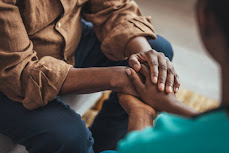I just finished reading the book Tuesdays with Morrie by Mitch Albom. I know, I’m probably one of the few people in my age group (early 60s) who hasn’t read that classic. This book looks right at death, square in the face, without the blink of an eye. No holds barred. Here it is. Let’s see it, touch it, and maybe…even...embrace it.
I found the whole read absolutely and incredibly freeing.
In this book, author Mitch Albom spends the last 14 Tuesdays of Morrie’s life discussing death with him. Morrie is dying from ALS—Amyotrophic Lateral Sclerosis—also known as Lou Gehrig’s Disease. The last thing Morrie wants to do is pretend it’s not happening. During these conversations with Mitch, not only does Morrie discuss his slow slide into death, but in doing so, he offers profound wisdom and insights on life.
Truth is, we are all going to die someday. We just don’t know when. Some will have many years, and some will not have very many at all. Some will spend months or years fighting an illness, others will be here one minute and gone the next. There are no guarantees in this life. Well, maybe two. You know the old saying – the only things guaranteed in life are death and taxes. Funny, people talk plenty about taxes, and rarely about death.I’m not referring to the kind of death we watch on television or in the movies. There’s no scarcity of discussion on that kind of death. But let’s face it, that’s not real death. It’s manufactured for entertainment. I guess that’s why people can talk plenty about death on the screen. But real-life, not kidding, this-is-really-it death? Easier to change the subject.
Let’s talk semantics. How about that word—death. Most people hate that word. I know I don’t care for it. It sounds so final, so cruel, so unforgiving. No wonder people avoid it. Whether you believe in an afterlife or not, It is the unknown, and that’s scary. There’s a sense, a hope, that by not talking about it, it’ll all go away.
But for those of us who know (not only from what we’ve heard or read, but more so from what we’ve experienced) that life continues after we breathe our last breath on earth, death is actually not the end. Back to semantics—death, to me, means only death of the body. Life does not end. As Albert Einstein famously said, “Energy cannot be created or destroyed, it can only be changed from one form to another.” It continues as non-physical energy. I’ll be honest. That not only comforts me, but it fascinates me.
Just as it is your choice to live life the way you want to, you can also put your own signature on death. In the book, Morrie chose to talk about it, and Mitch chose to listen. That’s pretty profound in and of itself. How many people do that? Have you ever known anyone who was dying? Did you ask them about it? Or did you skirt around the elephant in the room and proceed as if everything was fine and they weren’t sick? Maybe it was easier not to call or visit. So awkward. And we don’t like feeling awkward. I know I don’t.
Or what if it is you who have received an unpleasant diagnosis that uncomfortably points toward your physical demise. Same questions here; do you talk about it? Or do you avoid that discussion with others at all costs? Do you pretend it’s not happening? Still awkward.
Yet not talking about it is precisely why it’s awkward. It’s not anyone’s fault that this discussion is awkward. We just have never learned to have it! Most people would rather keep it in the dark. Yet many of us are afraid of the dark. For some people it’s even shameful to admit to. It feels like failure. But shame can only exist in the darkness. As soon as you shine a light on it, it loses its stigma. According to Brene Brown, “Shame cannot survive being spoken.” By speaking about death, it becomes what it is…as much a part of life as anything else.
So I took a good hard look at this thing called death. And soon I had a desire to shine a light on it. Eventually, like Morrie, I found I wanted to speak about it and to learn all I could about it. I wanted to talk to people who had been through what I had been through. I wanted to share my experience and listen to theirs. I read book after book on the subjects of death and grief, as well as near-death experiences and the afterlife. I listened to dozens of experts on grief and spirituality. I joined support groups where this discussion is not taboo, where it is welcomed and embraced. And little by little, I found the profound lessons in all of it, and dare I say, the beauty.
You see, out of that frightening and tragic death diagnosis, Morrie experienced great love. People came to Morrie and loved him in a way they had never loved him before. They were changed by this exchange of love. They had the opportunity to serve Morrie by showing up, supporting him, and listening to him. Just listening. What a gift to take the time in this oppressively busy, non-stop world to be with someone and just listen, not try to fix it or tell him it will be okay. That image in my head of a dying man surrounded by caring helpers who adjusted him in his wheelchair every 20 minutes because he no longer had the strength to do it himself, placed a jacket around him when he was cold, and fixed his glasses if they started slipping down his nose - that picture of love brought me to tears. Not sadness, but a profound, unexplainable joy of that which is good in this world. That is same love that my family and I were surrounded by during the immediate days and weeks after my son’s accident. That is God at work.At one point during the time spent with Mitch, Morrie said to him, “Once you learn how to die, you learn how to live.” And then he leaned in every so slightly, as much as his body would allow him at the time, and repeated, “Once you learn how to die, you learn how to live.”
You learn. It is a lesson, a lesson in the situation we all avoid at all costs. Morrie accepted it as a profound lesson. The beautiful humility in that statement really gave me pause. Somewhere in there, in that horrific feeling of having the rug pulled out from underneath you, are lessons…on life. The beauty in the simplest of moments. The significance of each little act of kindness. The recognition of what matters most. Can we see it? Can we allow those lessons to be planted within us, and then bloom?
Buddhist monk and spiritual teacher Thich Nhat Hanh put it perfectly when he explained that there can be no lotus without the mud. That which appears to be murky, disagreeable, or even frightening can actually bring forth something of beauty. In that same vein, Brian Smith, host of the podcast Grief2Growth and parent of a beautiful daughter in spirit, Shayna, has said that though we may feel buried by our challenges and losses, maybe - just maybe - like a seed we have been planted. I feel this in my heart to be true.I am no longer afraid of death. Looking at it and talking about it has taken away that fear. I am now at a place of new understanding about this whole subject of death. In fact, I am awed by it. The love continues to flow from me and my family to my son and from him to us. No doubt the love that surrounded Morrie continues to ripple out as well. It is never-ending. There truly is more to this than meets the eye. The depths to this mystery are boundless. But the lessons from my son’s death continue to evolve and unfold. Though I’d rather have my son back, I am grateful, ever so grateful, for all I have learned since his spirit exited his physical body.
Talking about death, touching it, and listening to others tell their stories will bring forth the lessons in the hardest and darkest challenges of life. Shine a light on it. It will undoubtedly change us, and I do believe, for the better.
(Read more about my journey from grief to hope in my books Look Around and A Bird Called Wisdom.)





